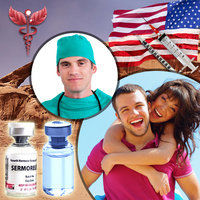Introduction to Late-Onset Hypogonadism
Late-onset hypogonadism (LOH), also known as age-related low testosterone, is a clinical and biochemical syndrome characterized by a deficiency in serum testosterone levels in conjunction with specific signs and symptoms. Predominantly affecting men over the age of 40, LOH can significantly impact quality of life. Early detection and management are crucial for mitigating the associated health risks and improving overall well-being among American males.
Symptoms and Diagnosis of LOH
The manifestations of LOH can be subtle and often overlooked, making early detection challenging. Common symptoms include decreased libido, erectile dysfunction, fatigue, mood alterations, and loss of muscle mass. These symptoms can be mistaken for normal aging, which underscores the importance of proactive screening. Diagnosis typically involves a thorough clinical evaluation, including a detailed medical history and physical examination, followed by blood tests to measure total and free testosterone levels. It is recommended that testosterone levels be assessed in the morning, as they tend to be highest at that time.
The Importance of Early Detection
Early detection of LOH is paramount for several reasons. Firstly, it allows for timely intervention, which can prevent the progression of symptoms and associated comorbidities such as osteoporosis, cardiovascular disease, and metabolic syndrome. Secondly, early identification enables the implementation of lifestyle modifications and therapeutic strategies that can significantly enhance quality of life. For instance, testosterone replacement therapy (TRT), when appropriately prescribed, can alleviate symptoms and restore vitality.
Screening Recommendations for American Males
Given the prevalence of LOH among American males, routine screening is advisable, particularly for those over the age of 40 with risk factors such as obesity, diabetes, and chronic illnesses. The Endocrine Society recommends considering testosterone testing in men with consistent symptoms of androgen deficiency and a total testosterone level below the normal range. Regular check-ups and open communication with healthcare providers are essential for early detection and management.
Treatment and Management Strategies
Upon diagnosis, a tailored treatment plan should be developed, taking into account the individual's overall health, symptoms, and testosterone levels. TRT is a common approach, available in various forms such as injections, gels, and patches. However, it is not suitable for everyone, and potential risks and benefits must be carefully weighed. Lifestyle interventions, including regular exercise, a balanced diet, and weight management, can also play a crucial role in managing LOH. Additionally, addressing underlying conditions such as sleep apnea and depression can improve outcomes.
The Role of Education and Awareness
Increasing awareness about LOH among American males is vital for promoting early detection and treatment. Educational campaigns can help men recognize the symptoms and understand the importance of seeking medical advice. Healthcare providers should also be vigilant in screening for LOH, especially in at-risk populations. By fostering a culture of proactive health management, we can empower men to take control of their well-being and mitigate the impact of LOH.
Conclusion
Late-onset hypogonadism is a prevalent condition that can significantly affect the quality of life of American males. Early detection through routine screening and awareness is crucial for timely intervention and effective management. By understanding the symptoms, undergoing regular check-ups, and adopting a holistic approach to treatment, men can mitigate the effects of LOH and maintain their health and vitality. As a society, we must prioritize education and proactive health measures to address this important health issue.
Contact Us For A Fast And Professional Response

- Exploring Alternative Therapies for Late-Onset Hypogonadism in American Males [Last Updated On: February 20th, 2025] [Originally Added On: February 20th, 2025]
- Economic Impact of Late-Onset Hypogonadism on American Men's Healthcare [Last Updated On: March 16th, 2025] [Originally Added On: March 16th, 2025]
- Nutrition's Role in Managing Late-Onset Hypogonadism in American Males [Last Updated On: March 17th, 2025] [Originally Added On: March 17th, 2025]
- Managing Late-Onset Hypogonadism: Symptoms, Diagnosis, and Treatment for American Men [Last Updated On: March 18th, 2025] [Originally Added On: March 18th, 2025]
- Late-Onset Hypogonadism: Symptoms, Diagnosis, and Treatment in American Males [Last Updated On: March 19th, 2025] [Originally Added On: March 19th, 2025]
- Genetic Predisposition and Ethnic Impact on Late-Onset Hypogonadism in American Males [Last Updated On: March 19th, 2025] [Originally Added On: March 19th, 2025]
- Late-Onset Hypogonadism: Effects on Male Fertility and Management Strategies [Last Updated On: March 20th, 2025] [Originally Added On: March 20th, 2025]
- Late-Onset Hypogonadism: Impact on Muscle Mass in American Men and Management Strategies [Last Updated On: March 20th, 2025] [Originally Added On: March 20th, 2025]
- Managing Late-Onset Hypogonadism: Detection, Lifestyle, and Hormone Therapy in American Men [Last Updated On: March 20th, 2025] [Originally Added On: March 20th, 2025]
- Late-Onset Hypogonadism: Effects on Mood, Energy, and Quality of Life in American Men [Last Updated On: March 20th, 2025] [Originally Added On: March 20th, 2025]
- Advancements in Late-Onset Hypogonadism Treatment: Emerging Therapies and Personalized Medicine [Last Updated On: March 21st, 2025] [Originally Added On: March 21st, 2025]
- Late-Onset Hypogonadism: Symptoms, Diagnosis, and Management Strategies for American Men [Last Updated On: March 21st, 2025] [Originally Added On: March 21st, 2025]
- Exercise Strategies to Combat Late-Onset Hypogonadism in Aging American Males [Last Updated On: March 21st, 2025] [Originally Added On: March 21st, 2025]
- Late-Onset Hypogonadism: Symptoms, Long-Term Effects, and Management in American Men [Last Updated On: March 23rd, 2025] [Originally Added On: March 23rd, 2025]
- Hormone Replacement Therapy for Late-Onset Hypogonadism: Benefits, Risks, and Future Directions [Last Updated On: March 23rd, 2025] [Originally Added On: March 23rd, 2025]
- Exploring the Link Between Late-Onset Hypogonadism and Diabetes in American Males [Last Updated On: March 23rd, 2025] [Originally Added On: March 23rd, 2025]
- Late-Onset Hypogonadism: Understanding TRT, Side Effects, and Alternative Treatments [Last Updated On: March 23rd, 2025] [Originally Added On: March 23rd, 2025]
- Late-Onset Hypogonadism: Symptoms, Monitoring, and Management in American Males [Last Updated On: March 24th, 2025] [Originally Added On: March 24th, 2025]
- Late-Onset Hypogonadism: Impacts on American Men's Relationships and Treatment Options [Last Updated On: March 24th, 2025] [Originally Added On: March 24th, 2025]
- Late-Onset Hypogonadism: Impacts on Cognitive Function and Management Strategies [Last Updated On: March 24th, 2025] [Originally Added On: March 24th, 2025]
- Early Intervention Benefits for Late-Onset Hypogonadism in American Men [Last Updated On: March 24th, 2025] [Originally Added On: March 24th, 2025]
- Late-Onset Hypogonadism in American Males: Symptoms, Diagnosis, and Management Strategies [Last Updated On: March 25th, 2025] [Originally Added On: March 25th, 2025]
- Managing Late-Onset Hypogonadism: Holistic Approaches and Treatment Strategies [Last Updated On: March 25th, 2025] [Originally Added On: March 25th, 2025]
- Understanding Late-Onset Hypogonadism: Diagnosis and Management for American Males [Last Updated On: March 25th, 2025] [Originally Added On: March 25th, 2025]
- Late-Onset Hypogonadism in American Men: Symptoms, Diagnosis, and Management Strategies [Last Updated On: March 25th, 2025] [Originally Added On: March 25th, 2025]
- Late-Onset Hypogonadism in American Men: Symptoms, Diagnosis, and Management Strategies [Last Updated On: March 25th, 2025] [Originally Added On: March 25th, 2025]
- Managing Late-Onset Hypogonadism: Diet and Nutrition Strategies for American Men [Last Updated On: March 25th, 2025] [Originally Added On: March 25th, 2025]
- Late-Onset Hypogonadism: Understanding, Stigma, and Treatment in American Males [Last Updated On: March 25th, 2025] [Originally Added On: March 25th, 2025]
- Late-Onset Hypogonadism: Impact on Sexual Health and Management Strategies for American Men [Last Updated On: March 25th, 2025] [Originally Added On: March 25th, 2025]
- Emotional Journey of American Men with Late-Onset Hypogonadism: Challenges and Support [Last Updated On: March 25th, 2025] [Originally Added On: March 25th, 2025]
- Late-Onset Hypogonadism: Impact on Sleep and Management Strategies for American Men [Last Updated On: March 25th, 2025] [Originally Added On: March 25th, 2025]
- Managing Late-Onset Hypogonadism: Symptoms, Diagnosis, and Treatment in Aging Men [Last Updated On: March 26th, 2025] [Originally Added On: March 26th, 2025]
- Late-Onset Hypogonadism in Aging American Males: Symptoms, Diagnosis, and Multidisciplinary Management [Last Updated On: March 26th, 2025] [Originally Added On: March 26th, 2025]
- Dispelling Myths: Understanding and Managing Late-Onset Hypogonadism in American Men [Last Updated On: March 26th, 2025] [Originally Added On: March 26th, 2025]
- Understanding and Managing Late-Onset Hypogonadism in American Men: Symptoms, Diagnosis, and Treatment [Last Updated On: March 26th, 2025] [Originally Added On: March 26th, 2025]
- Community Support Enhances Life Quality for Men with Late-Onset Hypogonadism [Last Updated On: March 26th, 2025] [Originally Added On: March 26th, 2025]
- Untreated Late-Onset Hypogonadism: Health Risks and Importance of Early Intervention in US Men [Last Updated On: March 27th, 2025] [Originally Added On: March 27th, 2025]
- Financial Burden of Late-Onset Hypogonadism in American Men: Costs and Management [Last Updated On: March 27th, 2025] [Originally Added On: March 27th, 2025]
- Advanced Technologies Revolutionizing Late-Onset Hypogonadism Diagnosis in American Males [Last Updated On: March 27th, 2025] [Originally Added On: March 27th, 2025]
- Understanding Late-Onset Hypogonadism: Diagnosis and Management for American Men [Last Updated On: March 27th, 2025] [Originally Added On: March 27th, 2025]
- Cultural Perceptions and Management of Late-Onset Hypogonadism in American Men [Last Updated On: March 27th, 2025] [Originally Added On: March 27th, 2025]
- Understanding and Managing Late-Onset Hypogonadism in American Men: Symptoms, Diagnosis, and Treatment [Last Updated On: March 27th, 2025] [Originally Added On: March 27th, 2025]
- Late-Onset Hypogonadism: Impacts on American Men's Careers and Cognitive Function [Last Updated On: March 28th, 2025] [Originally Added On: March 28th, 2025]
- Managing Late-Onset Hypogonadism: Preserving Independence in American Men [Last Updated On: March 28th, 2025] [Originally Added On: March 28th, 2025]
- Advocating for Better Late-Onset Hypogonadism Care: A Guide for American Men [Last Updated On: March 28th, 2025] [Originally Added On: March 28th, 2025]
- Stress Exacerbates Late-Onset Hypogonadism in American Males: A Holistic Approach [Last Updated On: March 28th, 2025] [Originally Added On: March 28th, 2025]
- Legal Rights and Workplace Accommodations for American Men with Late-Onset Hypogonadism [Last Updated On: March 28th, 2025] [Originally Added On: March 28th, 2025]
- Managing Late-Onset Hypogonadism: Symptoms, Diagnosis, and Treatment for American Men [Last Updated On: March 28th, 2025] [Originally Added On: March 28th, 2025]
- Late-Onset Hypogonadism: Diagnosis, Treatment, and Management Strategies for American Men [Last Updated On: March 29th, 2025] [Originally Added On: March 29th, 2025]
- Holistic Management of Late-Onset Hypogonadism: Integrating Mental Health Support [Last Updated On: March 30th, 2025] [Originally Added On: March 30th, 2025]
- Late-Onset Hypogonadism: Family Support and Management Strategies for American Males [Last Updated On: March 30th, 2025] [Originally Added On: March 30th, 2025]
- Navigating Insurance Coverage for Late-Onset Hypogonadism in American Men [Last Updated On: April 1st, 2025] [Originally Added On: April 1st, 2025]
- Managing Late-Onset Hypogonadism: Lifestyle Strategies for American Men [Last Updated On: April 2nd, 2025] [Originally Added On: April 2nd, 2025]
- Late-Onset Hypogonadism: Peer Support's Role in Enhancing Men's Health and Well-being [Last Updated On: April 5th, 2025] [Originally Added On: April 5th, 2025]
- Late-Onset Hypogonadism in American Males: Symptoms, Treatment, and Lifestyle Management [Last Updated On: April 5th, 2025] [Originally Added On: April 5th, 2025]
- Late-Onset Hypogonadism: Impact on Self-Esteem and Treatment Options for American Men [Last Updated On: April 5th, 2025] [Originally Added On: April 5th, 2025]
- Managing Late-Onset Hypogonadism: Stress Reduction Strategies for American Men [Last Updated On: April 6th, 2025] [Originally Added On: April 6th, 2025]
- Late-Onset Hypogonadism: Social Impacts and Management Strategies for American Men [Last Updated On: April 7th, 2025] [Originally Added On: April 7th, 2025]
- Late-Onset Hypogonadism in American Men: Advocacy and Management Strategies [Last Updated On: April 8th, 2025] [Originally Added On: April 8th, 2025]
- Research Advances in Late-Onset Hypogonadism: Diagnosis, Treatment, and Safety in the US [Last Updated On: April 9th, 2025] [Originally Added On: April 9th, 2025]
- Nutritionists' Role in Managing Late-Onset Hypogonadism Through Diet and Key Nutrients [Last Updated On: April 9th, 2025] [Originally Added On: April 9th, 2025]
- Managing Late-Onset Hypogonadism: Symptoms, Screening, and Treatment for American Men [Last Updated On: April 9th, 2025] [Originally Added On: April 9th, 2025]
- Late-Onset Hypogonadism: Symptoms, Diagnosis, and Treatment in American Males [Last Updated On: April 10th, 2025] [Originally Added On: April 10th, 2025]
- Exercise as a Key Strategy for Managing Late-Onset Hypogonadism in American Men [Last Updated On: April 10th, 2025] [Originally Added On: April 10th, 2025]
- Managing Late-Onset Hypogonadism: Strategies for American Men's Mental Health [Last Updated On: April 11th, 2025] [Originally Added On: April 11th, 2025]
- Late-Onset Hypogonadism: Emotional Impacts and Management Strategies for American Men [Last Updated On: April 13th, 2025] [Originally Added On: April 13th, 2025]
- Endocrinologists' Vital Role in Managing Late-Onset Hypogonadism in American Men [Last Updated On: April 14th, 2025] [Originally Added On: April 14th, 2025]
- Managing Late-Onset Hypogonadism: A Guide for American Men's Healthcare Navigation [Last Updated On: April 14th, 2025] [Originally Added On: April 14th, 2025]
- Late-Onset Hypogonadism: Understanding, Diagnosing, and Treating Age-Related Testosterone Decline [Last Updated On: April 15th, 2025] [Originally Added On: April 15th, 2025]
- Understanding and Managing Late-Onset Hypogonadism in Aging American Men [Last Updated On: April 16th, 2025] [Originally Added On: April 16th, 2025]
- Late-Onset Hypogonadism: Symptoms, Diagnosis, and Comprehensive Management Strategies [Last Updated On: April 17th, 2025] [Originally Added On: April 17th, 2025]
- Navigating Late-Onset Hypogonadism: Community Resources and Support for American Men [Last Updated On: April 17th, 2025] [Originally Added On: April 17th, 2025]
- Therapists' Crucial Role in Managing Late-Onset Hypogonadism in American Males [Last Updated On: April 18th, 2025] [Originally Added On: April 18th, 2025]
- Holistic Management of Late-Onset Hypogonadism in American Men: Diet, Exercise, and More [Last Updated On: April 18th, 2025] [Originally Added On: April 18th, 2025]
- Managing Late-Onset Hypogonadism: Symptoms, Diagnosis, and Treatment Options for American Men [Last Updated On: April 19th, 2025] [Originally Added On: April 19th, 2025]
- Late-Onset Hypogonadism: Impact on American Men's Professional Performance and Management Strategies [Last Updated On: April 19th, 2025] [Originally Added On: April 19th, 2025]
- Managing Late-Onset Hypogonadism: Lifestyle Strategies for American Men's Health [Last Updated On: April 20th, 2025] [Originally Added On: April 20th, 2025]
- Understanding Late-Onset Hypogonadism: Symptoms, Diagnosis, and Management in Aging Men [Last Updated On: April 20th, 2025] [Originally Added On: April 20th, 2025]
- Understanding Late-Onset Hypogonadism: Symptoms, Causes, and Treatment in Aging Men [Last Updated On: April 21st, 2025] [Originally Added On: April 21st, 2025]
- Late-Onset Hypogonadism: Impact, Challenges, and Advocacy for American Men's Health [Last Updated On: April 23rd, 2025] [Originally Added On: April 23rd, 2025]

















